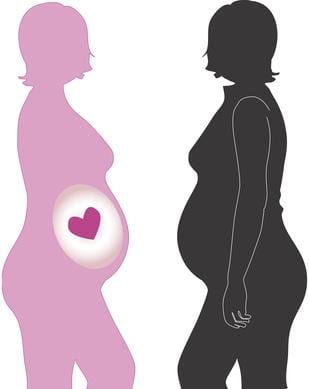While a mom-to-be is happy about the new bundle of joy growing in her belly, she might not so thrilled by the tummy troubles that commonly accompany pregnancy. Digestive problems plague many women as they progress through their term. Hormones combined with rapid body changes often fuel these troubles. Although many of these digestive disasters cannot be completely averted, simple dietary modifications can help a woman reduce her symptoms.
Nausea
Nausea is one of the first signs of pregnancy for many women. While no one knows for sure what causes moms-to-be to feel under the weather, most agree that it’s likely related to hormonal changes within the body, the Mayo Clinic reports. For most women, the nausea during pregnancy does not result in vomiting. Eating a bland diet, drinking plenty of water or tummy-soothing milk and snacking on nausea-busting crackers usually assuages the sensation. If your nausea is severe, consult your doctor as he can advise you of medical options to alleviate the problem.
Constipation
Pregnancy-related constipation is common, as the uterus begins to grow and limits normal bowel behavior. Hormones, and specifically progesterone, released during pregnancy also cause muscles to relax, making it harder for the bowel muscles to do their job in expelling waste, FamilyEducation reports. The iron commonly found in prenatal vitamins also plays a role in clogging up a mom-to-be’s pipes because it causes stools to harden, making them harder to pass. To alleviate constipation, drink plenty of liquids, eat high-fiber foods and exercise. Exercise increases the amount of oxygen that gets to the bowels and helps them work a bit better. Never take a laxative unless specifically directed to do so by a doctor, as these pills can be harmful to your baby.
Heartburn
Bouts of heartburn are also common during pregnancy. Heartburn occurs when the relaxed muscles allow food or digestive juices to move back into the esophagus, causing irritation and a burning sensation. Avoid the uncomfortable sensation by eating smaller meals, waiting two or thee hours after a meal before lying down and elevating your head while you sleep, WomensHealthMatters reports. Some antacids are safe for pregnant women, but you should ask your doctor before using any medication to combat heartburn.
Excessive Gas
Excessive gas can be a painful–and embarrassing–problem. BabyCenter reports that the increase in progesterone causes tissues to relax, slowing digestion and potentially leading to bloating and gas buildup in the bowels. This extra gas can cause mom to burp or fart, resulting in obvious embarrassment. To reduce the buildup, you must first figure out what’s behind the gas. Pay attention to your gas levels for several days, and try to isolate which foods seem to cause the most problems. Once you have determined what sends your digestive system into overdrive, reduce or cut out these culprit foods.
Photo Credit
- prospective mother image by Svetlana Bogomol from Fotolia.com





